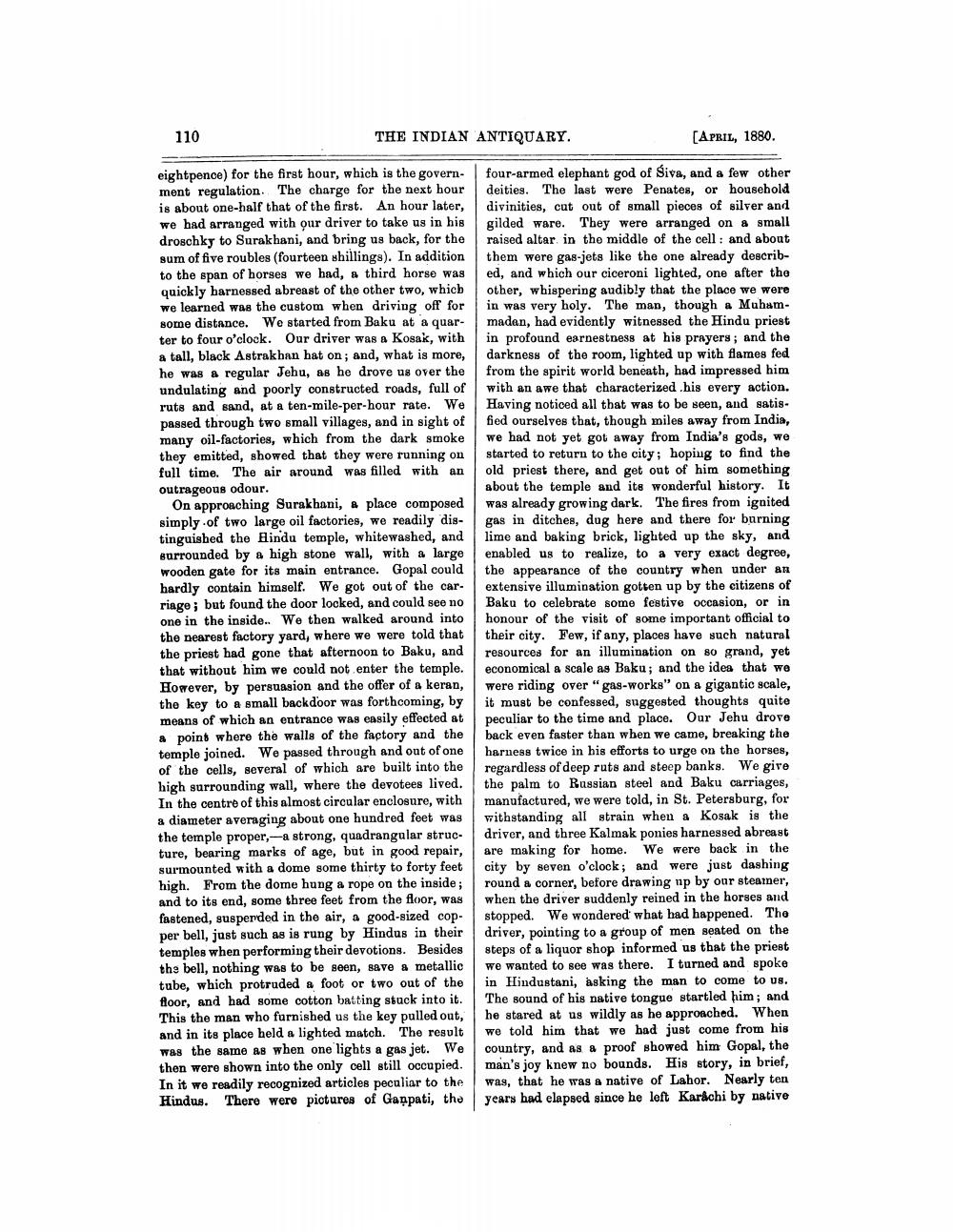________________
110
THE INDIAN ANTIQUARY.
eightpence) for the first hour, which is the government regulation. The charge for the next hour is about one-half that of the first. An hour later, we had arranged with our driver to take us in his droschky to Surakhani, and bring us back, for the sum of five roubles (fourteen shillings). In addition to the span of horses we had, a third horse was quickly harnessed abreast of the other two, which we learned was the custom when driving off for some distance. We started from Baku at a quarter to four o'clock. Our driver was a Kosak, with a tall, black Astrakhan hat on; and, what is more, he was a regular Jehu, as he drove us over the undulating and poorly constructed roads, full of ruts and sand, at a ten-mile-per-hour rate. We passed through two small villages, and in sight of many oil-factories, which from the dark smoke they emitted, showed that they were running on full time. The air around was filled with an outrageous odour.
On approaching Surakhani, a place composed simply of two large oil factories, we readily distinguished the Hindu temple, whitewashed, and surrounded by a high stone wall, with a large wooden gate for its main entrance. Gopal could hardly contain himself. We got out of the carriage; but found the door locked, and could see no one in the inside.. We then walked around into the nearest factory yard, where we were told that the priest had gone that afternoon to Baku, and that without him we could not enter the temple. However, by persuasion and the offer of a keran, the key to a small backdoor was forthcoming, by means of which an entrance was easily effected at a point where the walls of the factory and the temple joined. We passed through and out of one of the cells, several of which are built into the high surrounding wall, where the devotees lived. In the centre of this almost circular enclosure, with a diameter averaging about one hundred feet was the temple proper,-a strong, quadrangular structure, bearing marks of age, but in good repair, surmounted with a dome some thirty to forty feet high. From the dome hung a rope on the inside; and to its end, some three feet from the floor, was fastened, suspended in the air, a good-sized copper bell, just such as is rung by Hindus in their temples when performing their devotions. Besides the bell, nothing was to be seen, save a metallic tube, which protruded a foot or two out of the floor, and had some cotton batting stuck into it. This the man who furnished us the key pulled out, and in its place held a lighted match. The result was the same as when one lights a gas jet. We then were shown into the only cell still occupied. In it we readily recognized articles peculiar to the Hindus. There were pictures of Ganpati, the
[APRIL, 1880.
four-armed elephant god of Siva, and a few other deities. The last were Penates, or household divinities, cut out of small pieces of silver and gilded ware. They were arranged on a small raised altar in the middle of the cell: and about them were gas-jets like the one already described, and which our ciceroni lighted, one after the other, whispering audibly that the place we were in was very holy. The man, though a Muhammadan, had evidently witnessed the Hindu priest in profound earnestness at his prayers; and the darkness of the room, lighted up with flames fed from the spirit world beneath, had impressed him with an awe that characterized his every action. Having noticed all that was to be seen, and satisfied ourselves that, though miles away from India, we had not yet got away from India's gods, we started to return to the city; hoping to find the old priest there, and get out of him something about the temple and its wonderful history. It was already growing dark. The fires from ignited gas in ditches, dug here and there for burning lime and baking brick, lighted up the sky, and enabled us to realize, to a very exact degree, the appearance of the country when under an extensive illumination gotten up by the citizens of Baku to celebrate some festive occasion, or in honour of the visit of some important official to their city. Few, if any, places have such natural resources for an illumination on so grand, yet economical a scale as Baku; and the idea that we were riding over "gas-works" on a gigantic scale, it must be confessed, suggested thoughts quite peculiar to the time and place. Our Jehu drove back even faster than when we came, breaking the harness twice in his efforts to urge on the horses, regardless of deep ruts and steep banks. We give the palm to Russian steel and Baku carriages, manufactured, we were told, in St. Petersburg, for withstanding all strain when a Kosak is the driver, and three Kalmak ponies harnessed abreast are making for home. We were back in the city by seven o'clock; and were just dashing round a corner, before drawing up by our steamer, when the driver suddenly reined in the horses and stopped. We wondered what had happened. The driver, pointing to a group of men seated on the steps of a liquor shop informed us that the priest we wanted to see was there. I turned and spoke in Hindustani, asking the man to come to us. The sound of his native tongue startled him; and he stared at us wildly as he approached. When we told him that we had just come from his country, and as a proof showed him Gopal, the man's joy knew no bounds. His story, in brief, was, that he was a native of Lahor. Nearly ten years had elapsed since he left Karachi by native




